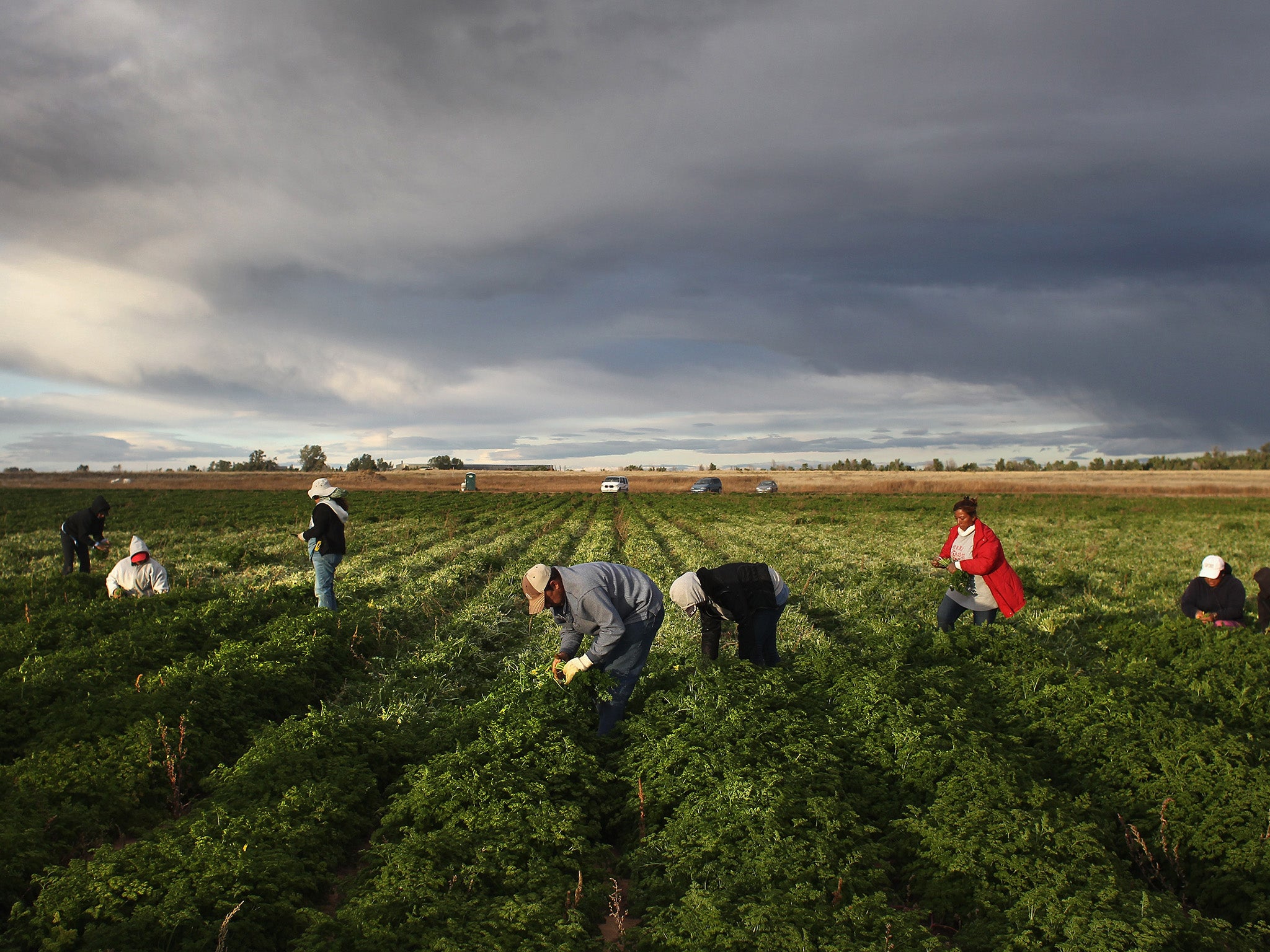Brexit plan to bring in more non-EU workers could lead to 'sharp rise' in exploitation, warns charity
Thousands of foreign workers could be at risk of modern slavery in UK as reliance on employer for visas means anyone attempting to escape exploitation could face deportation, campaigners say

Government plans to bring in temporary migrant workers to the UK from outside the EU to fill labour shortfalls after Brexit could leave thousands of people at risk of exploitation, campaigners have warned.
Proposals for 5,000 non-EU workers to come on six-month visas to work on British farms over the next two years could create a hotbed for modern slavery unless key safeguards are adopted, according to charity Focus on Labour Exploitation (Flex).
Under current plans, the workers’ visas will be tied to a specific employer, which Flex said unscrupulous bosses would be able to use to threaten to fire workers who dare to complain.
The reliance on their employer for their visa would in turn create a situation whereby anyone attempting to escape an exploitative situation could face deportation, the charity said.
Flex also warned that migrant workers were at risk of being scammed into paying foreign-based recruiters extortionate fees, which typically lead to heavy debts and can increase the hold an employer has over the worker.
It follows warnings from the Migration Advisory Committee (MAC) on Tuesday that the proposed scheme offered “considerable control” to employers, thereby posing a risk of abuse.
Caroline Robinson, director at the charity, said: “Temporary migration programmes can increase workers’ vulnerability to exploitation and even slavery.
“Workers with visas tied to a single employer are unable to defend themselves if they are paid less than promised or if they are expected to work longer hours and in worse conditions than initially agreed.
“If the government is going to increase risk to workers through a temporary scheme, then they must heed the MAC’s warnings and ensure there are enhanced protection measures in place.
“Otherwise there is a real danger that we could see a sharp rise in exploitation on British farms next year.”
The new pilot, announced by the government earlier this month, will mean 2,500 workers from outside the EU will be able to come to the UK each year to do seasonal work for fruit and vegetable farmers for up to six months.
Announcing the plan, home secretary Sajid Javid said it would ensure farmers had access to the seasonal labour they need to remain “productive and profitable during busy times of the year”, and expressed his commitment to an immigration system which “welcomes those who benefit Britain”.
In a major report on Tuesday, the MAC said it was important that the newly-announced pilot scheme was properly evaluated to ensure it is not an “easy option” that allows the agricultural sector access to low-skilled migrant labour on a permanent basis.
“Ensuring proper compliance is very important as employers would have considerable control over their workers due to their visa status and there would need to be robust mechanisms in place to ensure that this does not lead to abuse,” the report states.
There are already estimated to be between 10,000 and 13,000 potential victims of modern slavery in the UK, with labour exploitation, sexual exploitation and domestic servitude the most frequent types of exploitation recorded.
Theresa May announced last year that efforts to tackle the “evil” crime were to get a £33m boost and a new taskforce to coordinate the response.
But concern has been mounting that the government’s “hostile” immigration policies have been impeding efforts to reduce the crime, and in some cases being prioritised over the protection of victims.
Flex said that in order for the deportation of workers trying to escape exploitative situations not to become “endemic” in the British farming and food sectors, it was “vital” that all temporary migrant workers are given the right to change employer.
It insisted that recruitment costs must also be covered by the employer and that there was credible oversight and enforcement of overseas recruitment agencies.
The warning comes after a separate study, by Oxford Economics, warned that taxes would have to rise if Brexit brings strict curbs on EU workers, because they pay far more to the public purse than British-born residents.
Migrants from the EU contribute £2,300 more to the exchequer each year in net terms than the average adult, and over their lifetimes they pay in £78,000 more than they take out in public services and benefits – compared to a net lifetime contribution of zero for the average UK citizen, the analysis found.
Responding to the warnings, a Home Office spokesperson said the department would carefully consider the MAC’s recommendations before setting out further detail on the UK’s future immigration system.
“After we leave the EU, we will take back control of our borders and put in place an immigration system that works in the interests of the whole of the UK,” they said.
“We commissioned this report in addition to our engagement with business to better understand the impact of EU citizens on the UK labour market. The government is clear that EU citizens play an important and positive role in our economy and society and we want that to continue after we leave.”
Join our commenting forum
Join thought-provoking conversations, follow other Independent readers and see their replies
Comments
Bookmark popover
Removed from bookmarks